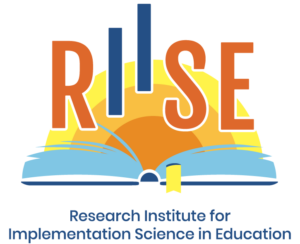 |
|
Courtenay A. Barrett, Ph.D., is an Assistant Professor in the School Psychology Program in the College of Education at Michigan State University, a licensed psychologist in Michigan, and Nationally Certified School Psychologist. Dr. Barrett’s research agenda focuses on implementation science, economic evaluations of evidence-based practices in schools, data-based decision making, systems-level change, and classroom- and systems-level professional development, coaching, and consultation. Website and Contact Information |
 |
|
Aaron Campbell, Ph.D., M.A., earned her master’s degree in clinical psychology from North Carolina Central University before attending the College of Education and Human Development at Texas A&M University (TAMU), earning her doctorate in educational psychology with an emphasis in special education in August 2021. After one year as an Assistant Professor of Special Education at the Pennsylvania State University she transitioned to the same position at the University of Missouri College of Education & Human Development. She currently serves as a Co-Director of Scholars in Multi-Tiered Approaches to Research and Training in Mental and Behavioral Health (SMART-MBH) that focuses on refining and testing interventions to reduce exclusionary discipline practices, improve student teacher relationships, increase instructional and classroom time for marginalized students with or at risk of an Emotional and Behavioral Disorder (EBD), and culturally responsive Social Emotional Learning (SEL) and culturally responsive Positive Behavior Interventions Supports. Dr. Campbell also provides technical assistance to state, district and school level teams across the nation on preventative practices, including addressing implicit bias in classroom management, school discipline, effective classroom behavior management strategies, and culturally responsive SEL. Dr. Campbell’s teaching and research focus on culturally responsive intervention delivery within a multi-tiered behavior support framework with a specific emphasis on supporting historically marginalized children and youth in schools and communities. Website and Contact Information |
 |
|
Elizabeth Connors, Ph.D., is an Assistant Professor at the Yale School of Medicine Department of Psychiatry and at the Child Study Center. She is also an Adjunct Assistant Professor and Director of Quality Improvement at the University of Maryland National Center for School Mental Health. Dr. Connors studies implementation strategy selection methods and application to promote the integration of evidence-based mental health practices in schools. With funding from sponsors such as the National institute of Mental Health, she collaborates with community, school, district and state partners to implement measurement-based care, trauma-sensitive practices, and various domains of comprehensive school mental health system quality improvements in K-12 schools. Website and Contact Information |
 |
|
Andy Garbacz, Ph.D., is an Associate Professor in the Department of Educational Psychology at the University of Wisconsin–Madison. Andy’s work focuses on aligning and integrating family-school-community partnership practices in schools and communities to promote youth mental health and family wellness. Andy emphasizes equity, cultural responsiveness, and community-engaged scholarship in his work. Andy serves as PI or Co-PI on multiple federal grants that focus on direct work with families, school personnel, and community mental health professionals. Website and Contact Information |
 |
|
Kelly Harris, Ph.D., CCC-SLP, is an Assistant Professor of Occupational Therapy and Surgery (Public Health Sciences) at Washington University in St. Louis, School of Medicine, and leads the Health Equity, Opportunity, and Education (HOPE) Research Lab. She is also a licensed Speech-Language Pathologist, and has provided clinical services in medical, educational, and community settings for over 20 years. Dr. Harris’ research agenda seeks to understand how systemic racism and specifically efforts to support and resist equity in health and educational settings operates to limit achievement and opportunity for youth. She is particularly interested in disrupting patterns of systemic injustice by understanding and addressing the complications of chronic diseases and the unidentified impacts these conditions have on everyday life for youth in community and educational settings. As an NIH/NCATS KL2 funded mixed methods researcher, Dr. Harris has expertise in quantitative and geospatial analysis, and qualitative methods particularly in youth serving institutions and with adolescents. Her current projects include (1) an examination of the relationship between early child health and school readiness, (2) partnerships with local schools to collaboratively develop and implement supports for students with asthma and other chronic conditions, and (3) an examination of the impact of chronic diseases on occupation and participation for youth. She is also co-investigator a study examining the implementation of COVID-19 testing in K-12 schools. Website and Contact Information |
 |
|
Shannon Holmes, Ph.D., is an Assistant Professor in the Department of Educational, School & Counseling Psychology at the University of Missouri and a faculty affiliate of the Missouri Prevention Science Institute. Dr. Holmes’ research seeks to improve the use of evidence-based practice in schools and facilitate children’s healthy development through: (1) the identification of active ingredients of evidence-based behavioral interventions; (2) the assessment of fidelity; and (3) the promotion of evidence-based practice through responsive and adaptive coaching support. Dr. Holmes has received internal and external funding to support her work and is currently co-principal investigator on an Institute of Education Sciences development and innovation grant. Website and Contact Information |
 |
|
Leigh McLean, Ph.D., M.S., is an Associate Research Professor in the School of Education and Center for Research in Educational and Social Policy at the University of Delaware. In her program of research, she investigates how teachers’ emotions and emotion-related experiences including well-being impact their effectiveness. She is particularly interested in how teachers’ emotions impact their instructional practices, and the role that early-career teachers’ emotions play as they transition into the career. She holds expertise in quantitative, mixed-methods, and longitudinal study design and implementation, multileveled data analysis, and classroom observation. She is currently PI on two federally funded projects: one from the Institute of Education Science exploring how elementary teachers’ feelings and beliefs impact their effectiveness in the content areas they teach, and one from the National Science Foundation exploring how the mentored teaching experience impacts elementary mathematics teachers’ effectiveness during the early career stage. Website and Contact Information |
 |
|
Stephanie Shire, Ph.D., is an Associate Professor in Early Intervention and Early Childhood Special Education in the Department of Special Education and Clinical Sciences in the College of Education at the University of Oregon. Her research focuses on the development and testing of interventions in real-world community settings in partnership with schools, practitioners, and families of young children with autism and other neurodevelopmental disabilities. Website and Contact Information |
 |
|
Jessica R. Toste, Ph.D., is an Associate Professor in the Department of Special Education at The University of Texas at Austin. She holds research affiliations with the Meadows Center for Preventing Educational Risk and the Texas Center for Equity Promotion. Her research is focused on methods for intensifying intervention for students with persistent reading challenges, including those with reading disabilities (RD). She is principal investigator on federally sponsored projects from the Institute of Education Sciences that aim to develop programs to support teachers’ expertise in data-based decision-making and students’ self-determined learning to accelerate reading intervention outcomes. Dr. Toste is the current Chair of the Provost’s Teaching Fellows and was named one of the 2017 “Texas 10” professors at UT Austin. She is the President-Elect of the Division of Learning Disabilities of the Council for Exceptional Children (CEC). She also serves on the executive leadership committee of the Board of Directors for GLSEN, a leading national organization focused on LGBTQ+ issues in K-12 education; and is the Immediate Past Chair of the Board of Directors for Disability Rights Texas, the federally designated legal protection and advocacy agency for people with disabilities in Texas. Website and Contact Information |
 |
|
Ericka Weathers, Ph.D., is an Assistant Professor in the Policy, Organizations, Leadership, and Systems Division of the Graduate School of Education at the University of Pennsylvania. Dr. Weathers’ uses quasi-experimental research methods to study the correlates, causes, and consequences of inequality in education. She also explores how K-12 education policies may reduce or exacerbate racial and socioeconomic inequality in education. Dr. Weathers’ uses her work to highlight the intended or unintended consequences of policy decisions and works with school districts and states to promote more equitable policies and practices. Her current areas of focus include school segregation, special education, and school discipline. Website and Contact Information |
 |
|
Tricia Zucker, Ph.D., is the Co-Director of the Children’s Learning Institute at the University of Texas Health Science Center at Houston. She is also the lead researcher behind Developing Talkers and Hablemos Juntos, groundbreaking oral language development programs proven to significantly expand children’s receptive and expressive vocabulary skills. The research proven intervention strategies have been incorporated and expanded upon in the language module of Scholastic’s new PreK curriculum. Dr. Zucker’s research interests include early identification and prevention of reading disabilities, evidence-based curriculum and instruction, effective use of technology for learning, family- and school-based interventions, and early childhood assessment. She is an expert in early literacy and language development, including development of inferential language skills. Her research focuses on children who are at-risk for learning disabilities. Website and Contact Information |

















